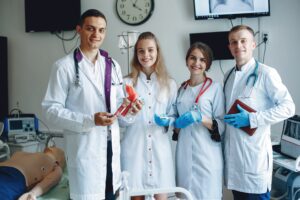Getting into the medical university is a challenge for aspiring doctors, especially if they have a low GPA. The increasing number of applicants and the limited number of seats made it extremely difficult for students with excellent academic records and high MCAT scores to gain admission in a medical school of their choice.
When competition is fierce, it is important to know which schools accept a low GPA and MCAT score. If you are one of those medical school hopefuls with less than perfect GPA and MCAT scores, a Caribbean medical school would be the best option for you.
If you are thinking, “Should I go to a Caribbean medical school? Why is it a better option? How many schools should I apply to? Will it offer advanced clinical training and offer better opportunities for residency and attending jobs? Here is a detailed guide that will help you choose the right American medical school of the Caribbean.
Medical Schools in the Caribbean – A Better Choice for Aspiring Doctors
Obtaining medical education from an accredited medical school in the Caribbean can help you fulfill your dream of pursuing an MD program and choose a rewarding career in the medical field. If truth be told, Caribbean medical schools offer quality medical education prospective students need to complete clinical rotations, get a perfect residency match, and obtain a license to practice medicine. In addition, choosing the best medical school in the Caribbean will not only help you successfully complete an MD degree but also help you reach your career goals.
Top Caribbean Medical Schools
There are many medical schools in the Caribbean, but only a few offer quality education, affordable tuition cost and allow graduates to practice medicine in different states of the U.S. Here is a list of the best medical schools in the Caribbean:
- Windsor University School of Medicine
- George’s University School of Medicine (SGU)
- Saba University School of Medicine
- American University of the Caribbean (AUC)
Windsor University School of Medicine
Year Established: 2008
Alumni +1000
Tuition Fee:
Basic Sciences (Term 1-5): $ 4,990.00 – $ 6,490.00
Clinical Sciences (Term 6-10): $ 6,490.00 per Term
4 Years: $52410 only tuition fee
Average MCAT – N/A
% Passing USMLE Step 1 on the First Attempt: 96%
Residency Acceptance Rate: 94% (2018)
St. George’s University (SGU)
Year Established: 1977
Alumni +15,000
Tuition Fee:
-
- Basic Sciences (Term 1-4): $28,000-$39,000 per Term
- Clinical Sciences (Term 1-5): $29,535 per Term
- 4 Years: $265,000
Average MCAT: 26
% Passing USMLE Step 1 on the First Attempt: 96%
Residency Acceptance: +900 (2018)
Saba University
Year Established: 1992
Alumni: +2,500
Tuition Fee:
-
- Basic Sciences (Term 1-5): $24,000-$26,000
- Clinical Sciences (Semesters 6-10): $27-000-$29,000
- 4 Years: +$163,000 (Tuition, not including other fees)
Average MCAT: N/A
% Passing USMLE Step 1 on the First Attempt – 99%
Residency Acceptance:
Ross University
- Year Established: 1978
- Alumni: +14,000
- Tuition Fee:
- Basic Sciences (Semesters 1-4): $22,345
- Clinical Sciences (Semesters 5-10): $24,660
- 4 Years: +$242,000
- Average MCAT: 796
- % Passing USMLE Step 1 on the First Attempt: 97%
- Residency Acceptance: 600 (2018)
American University of the Caribbean (AUC)
- Year Established: 1978
- Alumni: +6,500
- Tuition Fee:
- Basic Sciences (Semester 1-5): $21,695
- Clinical Sciences (Semester 6-9):$24,695
- Clinical Sciences (Semester 9.5): $12,970
- 4 Years: +$213,000 (Tuition, not including other fees)
- Average MCAT: 497
- % Passing USMLE Step 1 on the First Attempt: 94%
- Residency Acceptance: +300 (2018)
Why Should You Go to a Caribbean Medical School?
Easier Acceptance
A low MCAT score doesn’t mean you have to give up on your dream of choosing a career in medicine. Caribbean medical schools provide an excellent opportunity to students even with average GPA and MCAT scores to fulfill their dream of becoming a qualified physician. But that doesn’t mean that the MD programs they offer are low quality or students they accept are not competent.
Grades are only a part of the admission process; there are numerous other things Caribbean medical schools consider when it comes to evaluating applications. U.S. medical schools focus on academic records, while medical schools in the Caribbean focus on extracurricular activities, personal statement, recommendations, and volunteer work than GPA and MCAT. While evaluating the application, most Caribbean medical schools such as Windsor University School of Medicine don’t consider MCAT score and accept students with low MCAT. This is why, it is easier to gain admission in the American Caribbean medical schools compared to U.S. medical schools and considered as a better alternative to U.S. medical school.
Rolling Admissions
Applying to an American medical school of the Caribbean will definitely help you achieve your goal of becoming a doctor because they have rolling admissions. Caribbean medical schools accept students three times a year – January, May, and September and offer a hassle-free admission process. Whereas, U.S. medical schools only accept students once a year, if rejected, prospective students have to wait a complete year to reapply, and still, there is no guarantee of acceptance. If you have rejected from U.S. medical school, don’t worry, apply to an American medical school in the Caribbean and enroll in the MD program.
Smooth Admission Process
Although the admission requirements of Caribbean medical schools and U.S. medical schools are almost the same. However, applying to a Caribbean medical school is much easier than U.S. medical school. A hassle-free and smooth application process and dedicated staff members make the process easier and smoother.
Accreditation
Attending an accredited medical school is critically important to make yourself eligible for numerous residency opportunities and practice medicine in different states of U.S. and Canada. Before enrolling in any Caribbean medical school, make sure to do your research and choose the one that is accredited by the prestigious organizations and government bodies. When evaluating medical schools and pursuing an MD program, make sure the school is accredited by the World Federation for Medical Education (WFME). Also, ensure that the school has been approved by specific states that you might want to practice later in your career. Students who graduate from accredited Caribbean medical school are eligible to complete clinical rotations, get residency opportunities, obtain physician licensure and practice medicine in nearly all 50 states of U.S.
USMLE Pass Rate
USMLE Step 1score plays a major role in strengthening your residency application while making you eligible for a myriad of competitive residency positions. Residency program directors carefully consider your Step 1 score when it comes to evaluating graduates for residency positions. Caribbean medical schools have a high USMLE pass rate, which makes it a great choice for domestic and international students both to get medical education from a reputable and accredited Caribbean medical school.
Clinical Rotations
Many Caribbean medical schools are affiliated with teaching hospitals and send their students to the U.S. to complete their clerkship during clinical years. Graduating from a Caribbean medical school provides you an opportunity to get advanced clinical training and medical knowledge that can help you get a residency program of your choice. Receiving clinical training in the U.S. hospitals also help students learn how to deal with patients, create treatment plans, and treat different medical conditions.
Residency Placement
USMLE Step 1 and 2 scores, letters of recommendation, and personal statement are a few factors that residency program directors consider when it comes to evaluating your residency application. Attending a Caribbean medical school and pursuing an MD program will prepare you for many residency positions in your preferred fields.
Medical Specialties
Pursuing an MD program from an American Caribbean medical school prepares you for a number of lucrative opportunities in different medical fields. Choosing the right medical specialty that perfectly aligns your career goals and personality is the key to success.
Here is a list of medical specialties you can choose while studying in a Caribbean medical university.
- Cardiology
- Nephrology
- Neurology
- Geriatrics
- Hematology & Oncology
- Infectious Disease
- Pain Management
- Emergency Medicine
- Radiology, Dermatology
- Pulmonology
- Urgent Care
- Gastroenterology
- Pathology
- Anesthesiology
- Orthopedics
- Urology
- Neurosurgery
- Trauma Surgery
- Cardiothoracic surgery
- Vascular Surgery
- Plastic surgery
- ENT
- Ophthalmology
Offers Rewarding Medical Careers
- Allergist/Immunologist
- Anesthesiologist
- Cardiologist
- Colon and Rectal Surgeon
- Critical Care Medicine Specialist
- Endocrinologist
- Dermatologist
- Emergency Medicine Specialist
- Family Physician
- Gastroenterologist
- Geriatric Medicine Specialist
- Hematologist
- Hospice and Palliative Medicine Specialist
- Infectious Disease Specialist
- Nephrologist
- Neurologist
- Obstetrician and Gynecologist
- Oncologist
- Ophthalmologist
- Osteopath
- Pathologist
- Pediatrician
- Physiatrist
- Plastic Surgeon
- Podiatrist
- Preventive Medicine Specialist
- Pulmonologist
- Radiologist
- Rheumatologist
- General Surgeon
- Urologist
The Bottom Line
Getting accepted to an MD program is a huge success you should be proud of. There are more than 50 medical schools in the Caribbean, selecting the best medical schools to get into isn’t quite so easy. There are several factors that you should consider before enrolling in any particular school. Hopefully this detailed guide will help you choose the school that will make you a qualified doctor.








